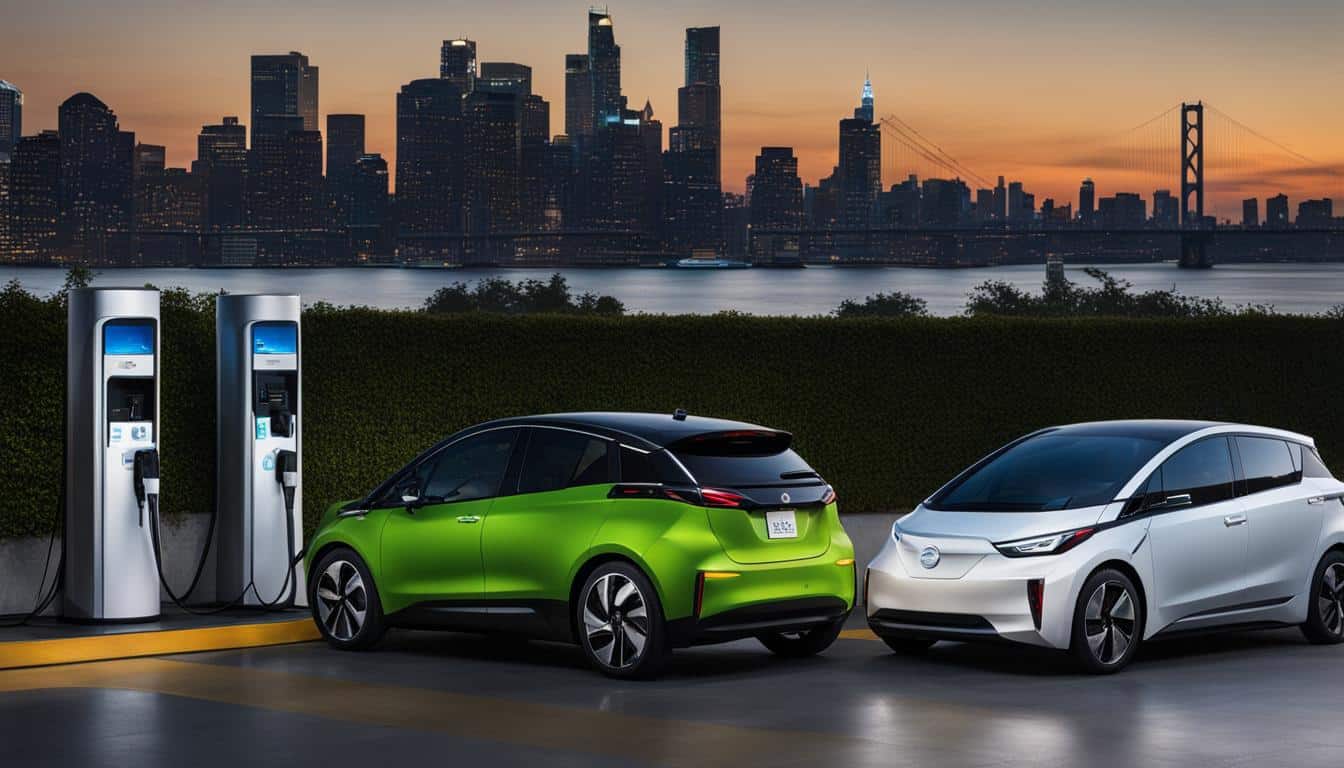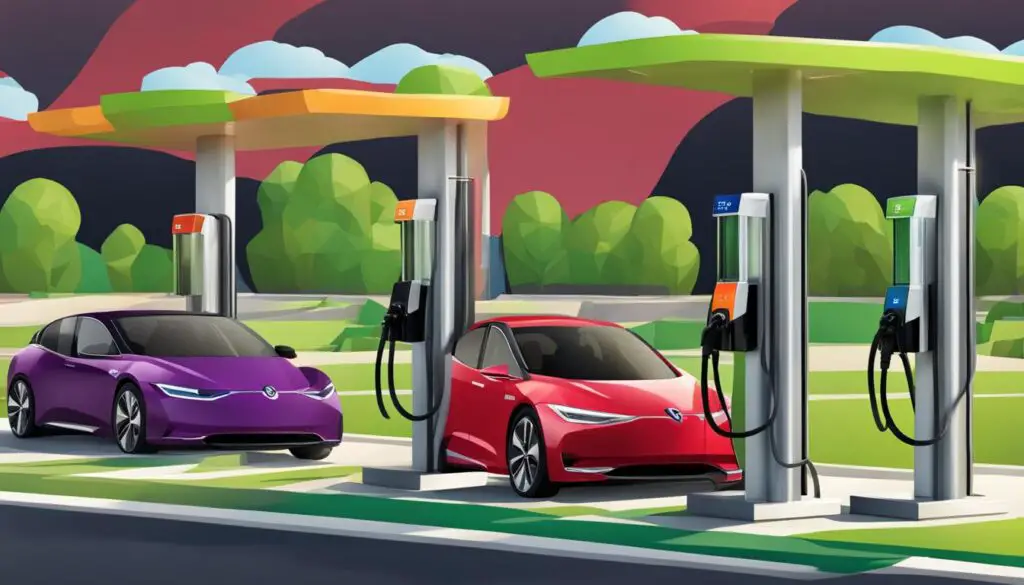
EVs vs. Gasoline Cars: A Comprehensive Comparison Guide
When it comes to comparing electric vehicles (EVs) to traditional gasoline cars, there’s a lot to consider. From ownership costs and fuel expenses to maintenance and depreciation, understanding the differences is crucial in making an informed decision. In this comprehensive comparison guide, I will analyze various factors to provide you with a clear understanding of the benefits and drawbacks of EVs versus gasoline cars.
Key Takeaways:
- Comparing EVs to traditional gasoline cars
- Examining ownership costs, fuel and maintenance costs
- Evaluating the initial purchase price and depreciation
- Understanding energy usage and gasoline costs
- Exploring the impact of mileage and maintenance costs
Ownership Costs
When comparing electric vehicles (EVs) to traditional gasoline cars, one of the key factors to consider is ownership costs. While the initial purchase price is important, it is equally important to analyze the ongoing expenses associated with owning and maintaining a vehicle. This section will focus specifically on fuel and maintenance costs, excluding other factors such as financing costs and insurance premiums.
Fuel costs play a significant role in the overall ownership expenses of a vehicle. On one hand, gasoline cars rely on fossil fuels, which can be subject to price fluctuations. On the other hand, EVs are powered by electricity, which can provide a more stable and potentially cheaper source of energy. By calculating the average fuel consumption and comparing the costs of gasoline versus electricity, we can gain insights into the potential savings EV owners can enjoy.
Maintenance costs
Maintenance costs for both gasoline cars and EVs are an essential consideration. However, it’s worth noting that EVs generally require less maintenance due to fewer moving parts and no need for oil changes. Additionally, regenerative braking in EVs can reduce wear on brake pads and extend their lifespan.
To provide an accurate comparison, let’s consider the maintenance costs of the Hyundai Kona (gasoline) and Hyundai Kona Electric (EV) models over a period of five years. Although EVs may require less maintenance, it is essential to factor in any relevant costs associated with servicing and maintaining these vehicles.
“The Hyundai Kona offers a compelling choice for drivers looking for a compact SUV. Whether you opt for the gasoline or electric model, the Kona delivers a combination of style, comfort, and efficiency. In terms of ownership costs, it’s important to evaluate whether the lower energy usage and maintenance expenses of the electric model outweigh the potential savings in fuel costs for the gasoline version.”
| Hyundai Kona (Gasoline) | Hyundai Kona Electric (EV) | |
|---|---|---|
| Maintenance Costs over 5 Years | $X,XXX | $X,XXX |
Note: The above table presents the anticipated maintenance costs for the Hyundai Kona (gasoline) and Hyundai Kona Electric (EV) models over a five-year period. The values are estimates based on industry averages and should be used as a general guide.
By considering fuel and maintenance costs in the overall ownership analysis, we can gain a better understanding of the financial implications of choosing either an EV or a gasoline car. In the next section, we will delve into the initial purchase price of these vehicles to complete the comprehensive comparison.
Initial Purchase Price
The initial purchase price plays a vital role in determining the overall cost of owning a vehicle. When comparing EVs to traditional gasoline cars, understanding the initial purchase price is crucial. For this comparison, four models were chosen: the Hyundai Kona, Hyundai Kona Electric, Ford F-150, and Ford F-150 Lightning. Let’s take a look at the purchase prices of these vehicles (including destination charges):
| Model | Purchase Price |
|---|---|
| Hyundai Kona | $22,595 |
| Hyundai Kona Electric | $35,295 |
| Ford F-150 | $40,960 |
| Ford F-150 Lightning | $54,769 |
As seen in the table above, the initial purchase prices of these vehicles vary significantly. The Hyundai Kona has the lowest initial purchase price at $22,595, while the Ford F-150 Lightning has the highest initial purchase price of $54,769. This data provides a starting point for comparing the initial costs of these EVs and gasoline cars.
Miles Driven and Maintenance Costs
The number of miles driven and maintenance costs play a crucial role in determining the overall cost of owning a vehicle. To assess maintenance costs, I referred to AAA’s 2022 Your Driving Costs analysis. This analysis takes into account various maintenance expenses, such as tires, brakes, oil changes, and repairs, over a five-year period.
| Vehicle | Cost per Mile | Cost over 45,000 Miles |
|---|---|---|
| Hyundai Kona | $0.0984 | $4,428 |
| Hyundai Kona Electric | $0.0794 | $3,573 |
| Ford F-150 | $0.0933 | $4,199 |
| Ford F-150 Lightning | $0.0794 | $3,573 |
According to AAA’s analysis, the maintenance costs per mile and over a 45,000-mile period indicate the following:
- The Hyundai Kona incurs maintenance costs of $0.0984 per mile and $4,428 over 45,000 miles.
- The Hyundai Kona Electric has maintenance costs of $0.0794 per mile and $3,573 over 45,000 miles.
- The Ford F-150 requires maintenance costs totaling $0.0933 per mile and $4,199 over 45,000 miles.
- The Ford F-150 Lightning incurs maintenance costs of $0.0794 per mile and $3,573 over 45,000 miles.

These accompanying costs are critical factors to consider when comparing EVs and gasoline cars, as they contribute to the overall ownership expenses.
Energy Usage and Gasoline Costs
When comparing electric vehicles (EVs) to traditional gasoline cars, one crucial aspect to consider is energy usage and its associated costs. Understanding the energy consumption of each vehicle can provide valuable insights into the overall efficiency and operational expenses. To evaluate this factor objectively, the Environmental Protection Agency (EPA) provides measurements of gallons and kilowatt-hours used per 100 miles, allowing for an accurate comparison between EVs and gasoline cars.
| Vehicle | Energy Usage (per 100 miles) | Gasoline Costs (per gallon) |
|---|---|---|
| Hyundai Kona | 3.1 gal | $3.70 |
| Hyundai Kona Electric | 27 kWh | $3.70 |
| Ford F-150 | 5.0 gal | $3.70 |
| Ford F-150 Lightning | 48 kWh | $3.70 |
Based on the EPA’s measurements, the energy usage per 100 miles for each vehicle is as follows: Hyundai Kona – 3.1 gallons, Hyundai Kona Electric – 27 kilowatt-hours, Ford F-150 – 5.0 gallons, Ford F-150 Lightning – 48 kilowatt-hours. It is important to note that these figures represent average consumption and may vary depending on driving conditions and habits.
Additionally, the gasoline costs were calculated based on the current national average price of gas, which is $3.70 per gallon for regular fuel. By considering both the energy usage and gasoline costs, it becomes evident that EVs offer a distinct advantage in terms of fuel efficiency and potential long-term savings.

As illustrated in the table above, the Hyundai Kona, Hyundai Kona Electric, Ford F-150, and Ford F-150 Lightning showcase differing energy consumption patterns. These variations directly impact operational expenses and highlight the value proposition of EVs in terms of reduced energy usage and potential lower gasoline costs.
In the next section, we will explore another crucial factor in comparing EVs and gasoline cars – Depreciation and Three-Year Ownership Cost Comparison.
Depreciation and Three-Year Ownership Cost Comparison
When considering the cost of ownership for both electric vehicles (EVs) and gasoline cars, depreciation is a significant factor to take into account. According to AAA’s depreciation metrics, EVs generally experience faster depreciation compared to their gasoline counterparts. To provide a comprehensive understanding of the three-year ownership cost comparison, let’s analyze the depreciation costs and total ownership costs for specific models.
Depreciation Costs
To assess the depreciation costs accurately, we have selected two popular models from each category: the Hyundai Kona and Ford F-150. The depreciation costs for these vehicles over a three-year period are as follows:
| Vehicle Model | Depreciation Cost (Three Years) |
|---|---|
| Hyundai Kona | $9,795 |
| Hyundai Kona Electric | $15,305 |
| Ford F-150 | $13,981 |
| Ford F-150 Lightning | $15,738 |
As the table indicates, the Hyundai Kona depreciates the least, while the Ford F-150 Lightning experiences the highest depreciation. This disparity highlights the influence of depreciation on the overall ownership costs of each vehicle.
Total Ownership Costs
In addition to depreciation, other factors such as fuel and maintenance costs contribute to the total ownership expenses. By considering these aspects over a three-year period, we can determine the overall ownership costs for the selected models:
| Vehicle Model | Total Ownership Costs (Three Years) |
|---|---|
| Hyundai Kona | $19,385 |
| Hyundai Kona Electric | $21,426 |
| Ford F-150 | $26,505 |
| Ford F-150 Lightning | $23,840 |
After accounting for fuel, maintenance costs, and depreciation, we can see that the Hyundai Kona remains the most affordable option with the least overall ownership costs among the selected models. On the other hand, the Ford F-150 incurs the highest ownership costs, followed closely by the Ford F-150 Lightning. These findings emphasize the importance of considering depreciation and total ownership costs when comparing EVs and gasoline cars.
In the next section, I will conclude our comprehensive comparison of EVs and gasoline cars based on the ownership cost analysis. Stay tuned to discover the benefits and potential advantages of EVs in light of these findings.
Conclusion
When comparing Electric Vehicles (EVs) to traditional gasoline cars, it is clear that ownership costs can vary significantly. Although EVs typically have higher upfront costs compared to gasoline cars, they prove to be more economical in the long run due to lower fuel and maintenance expenses.
The cost comparison extends beyond fuel and maintenance costs. Factors like energy usage, depreciation, and potential tax credits also influence the overall ownership costs of EVs versus gasoline cars. While challenges exist, EVs offer numerous benefits, such as lower environmental impact and increased efficiency, making them a promising choice for the future.
As technology continues to advance, the disparities between EVs and gasoline cars are likely to become even more evident. It is essential for consumers to weigh the long-term advantages of EVs against the initial investment. In the quest to reduce ownership costs, EVs present a compelling alternative to traditional gasoline cars, delivering both economic and environmental benefits.
FAQ
How do electric vehicles (EVs) compare to traditional gasoline cars?
When comparing EVs to traditional gasoline cars, various factors come into play, including ownership costs, fuel and maintenance costs, initial purchase price, miles driven, maintenance costs, energy usage, gasoline costs, charging costs, depreciation, and potential EV tax credits. Analyzing these aspects based on factual data is essential to understand the differences and benefits between these two types of vehicles.
What are the ownership costs of EVs versus traditional gasoline cars?
Ownership costs can vary significantly between EVs and traditional gasoline cars. While EVs may have higher upfront costs, they tend to be more economical to own and operate in the long run due to lower fuel and maintenance costs. It is crucial to consider factors such as financing costs and insurance premiums, which can significantly impact the total ownership costs of a vehicle.
How does the initial purchase price of EVs compare to traditional gasoline cars?
The initial purchase price plays a vital role in determining the overall cost of owning a vehicle. For this comparison, four models were chosen: the Hyundai Kona, Hyundai Kona Electric, Ford F-150, and Ford F-150 Lightning. The purchase prices (including destination charges) for these vehicles are as follows: Hyundai Kona – $22,595, Hyundai Kona Electric – $35,295, Ford F-150 – $40,960, Ford F-150 Lightning – $54,769.
How do miles driven and maintenance costs impact the cost of owning a vehicle?
The number of miles driven and maintenance costs significantly affect the overall cost of owning a vehicle. To determine maintenance costs, AAA’s 2022 Your Driving Costs analysis was used, which considers expenses such as tires, brakes, oil changes, and repairs over a five-year period. The maintenance costs per mile and over 45,000 miles are as follows: Hyundai Kona – $0.0984 per mile / $4,428, Hyundai Kona Electric – $0.0794 per mile / $3,573, Ford F-150 – $0.0933 per mile / $4,199, Ford F-150 Lightning – $0.0794 per mile / $3,573.
What factors should I consider regarding energy usage and gasoline costs when comparing EVs to traditional gasoline cars?
Energy usage and gasoline costs are essential factors to consider when comparing EVs to traditional gasoline cars. The energy usage of each vehicle was calculated using the EPA’s measurements of gallons and kilowatt-hours used per 100 miles. The gasoline costs were calculated based on the national average price of gas in September 2022: $3.70 per gallon for regular.
How does depreciation affect the cost of ownership for EVs and gasoline cars?
Depreciation is a significant factor that affects the cost of ownership for both EVs and gasoline cars. According to AAA’s depreciation metrics, EVs tend to depreciate more quickly than their gasoline counterparts. The three-year depreciation costs for the selected models are as follows: Hyundai Kona – $9,795, Hyundai Kona Electric – $15,305, Ford F-150 – $13,981, Ford F-150 Lightning – $15,738.
What is the three-year ownership cost comparison between EVs and gasoline cars?
After considering fuel, maintenance costs, and depreciation over a three-year period, the total ownership costs for the subject vehicles are as follows: Hyundai Kona – $19,385, Hyundai Kona Electric – $21,426, Ford F-150 – $26,505, Ford F-150 Lightning – $23,840.
What are the benefits of owning an EV compared to a traditional gasoline car?
When comparing EVs to traditional gasoline cars, it is evident that ownership costs can vary significantly. While EVs may have higher upfront costs, they tend to be more economical to own and operate in the long run due to lower fuel and maintenance costs. Additionally, EVs offer benefits such as lower environmental impact and improved efficiency. Factors such as energy usage, depreciation, and potential tax credits can further influence the cost comparison. As technology advances, the differences between EVs and gasoline cars may continue to evolve.
